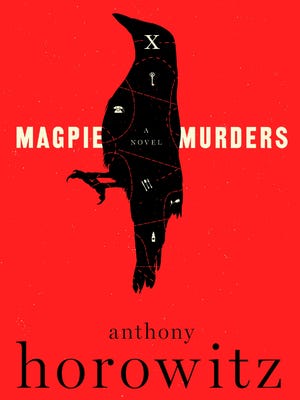'Magpie Murders' dishes up two tasty mysteries in one

Few contemporary authors are more acquainted with the craft of classic crime fiction than English writer Anthony Horowitz.
His many mystery novels include two Sherlock Holmes titles and a James Bond, done with the blessing of the Arthur Conan Doyle and Ian Fleming estates. His TV credits include scripts for Agatha Christie’s Poirot and the long-running series Midsomer Murders.
His latest novel, Magpie Murders (Harper, 496 pp., *** out of four stars), is a clever meditation on the whodunit genre by one of its leading experts. Self-referential even by crime fiction standards (the title’s similarity to Midsomer Murders, for example, is noted more than once), it’s a sharp novel about literature and publishing in the form of not one, but two entertaining by-the-numbers potboilers.
Magpie Murders takes its title from the book within the book, the ninth and final installment in author Alan Conway’s internationally best-selling Atticus Pünd mystery series, the manuscript of which accounts for half of Horowitz’s novel. In the words of Conway's editor Susan Ryeland, head of fiction at Cloverleaf Books and Horowitz’s narrator, “Alan had captured something of ‘the golden age’ of British whodunits with a country house setting, a complicated murder, a cast of suitably eccentric characters and a detective who arrived as an outsider,” and he used that formula to attain enormous wealth and a broad readership.
Alan’s novel shows a dying Atticus Pünd tackling one last case, investigating the suspicious death of a housekeeper and the murder of her rich employer in the quiet village of Saxby-on-Avon. The village may be small, but it is hopping with intrigue, with what seems like most of its residents resentful of the prosperous landowner Sir Magnus Pye (all puns intended, all book long). As the town doctor tells Atticus, “The fact is that half the village will have been glad to see him dead and if you’re looking for suspects, well, they might as well form a line.”

When the real world starts resembling Alan’s novel — not just in the endless borrowed back stories and stolen details, but with missing documents and shifty characters and a death that smells like murder — Susan finds herself in the role of detective. In pursuing the truth about Alan Conway and his final Atticus Pünd novel, she explores the complex, codependent/antagonistic relationship between author and creation.
There’s a lot of hand-wringing about the literary merit of Alan’s books (“They’re very well written. Millions of people enjoyed them.” “They’re worth nothing! Eighty thousand words to prove that the butler did it?”), and by extension, the genre in which Horowitz has spent most of his career.
Magpie Murders is, in a way, protected from criticism — if it demands suspension of disbelief, this is only in keeping with cozy convention. Susan, an avid crime reader and knowing narrator, is just as dissatisfied as the reader by the intervention of wild coincidence.
Still, the book could be shorter and more incisive — it takes the span of two crime novels to make its commentary about crime novels, a commentary devoid of criticism of a traditionally white and male-dominated genre, with a middle-age female narrator who is wonderful and intelligent but nonetheless believes life has passed her by because she is unmarried and childless.
But it is, ultimately, a smart, enjoyable read, with two satisfying mysteries for the price of one.
—————
Steph Cha writes the Juniper Song mystery series.